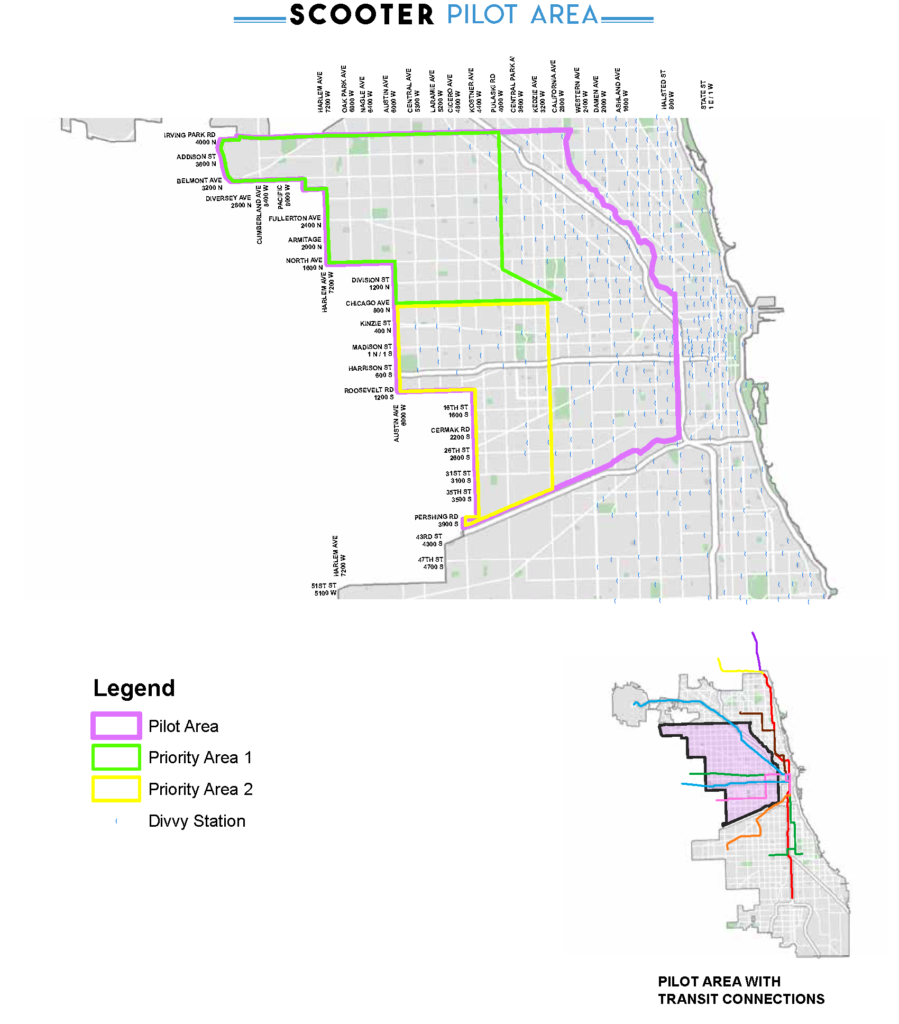E-Scooter Pilot Program, Chicago, Illinois, 2019
5 minutes Date Launched: Jun 15, 2019 Pilot Project Timeframe: 4 months

Summary
The City of Chicago launched a four-month e-scooter pilot program, beginning on June 15, 2019. The program was administered by the City’s Departments of Business Affairs and Consumer Protection (BACP) and Transportation (CDOT).
In addition to requirements typical to micromobility pilots re: fleet size, insurance, etc., the permit included additional service and equity considerations. The full permit requirements and terms are linked here and attached below, but highlights include:
- Vendors must share data through the Mobility Data Specification (MDS) standard. See the linked entry below for more details on MDS. These data were then made available over the City of Chicago Scooter Data Stream website.
- Scooters service hours: 5 AM-10 PM, with scooters removed from the public right of way outside of operating hours, and within 2 hours of leaving pilot hours.
- Service is accessible to unbanked users and those without a smartphone.
- Operators are required to develop an Access Plan to specify how the needs will be met for people who do not have credit or debit cards, and for people who do not have smart phones.
- At least 25% of the fleet is to be located in two lower-income priority zones (see map).
- Fleet size: 2,500 minimum-3,500 maximum.
- Vehicle requirements: No more than 15 MPH top speed.
- Liability insurance: $5,000,000 per incident.
The pilot area is also notable in that it is located outside of the Loop, Chicago’s Central Business District, and includes two lower-income priority zones that have relatively few Divvy bikeshare stations (see map below). Each of the operators are required to deploy 25 percent of their fleets in these priority zones.
Ten scootershare companies were selected to operate in the pilot period.
The thought behind 10 operators is that it will offer some insight into the different business models and what would work best in Chicago. However, there has also been some criticism that 10 operators might be too many given each requires its own app to track scooter availability and make a reservation – adding an obstacle to the user.
The pilot ended on October 15, 2019 and is currently under evaluation. However, a policy brief published by the Chaddick Institute, “A Day in the Life of Chicago’s E-Scooter Pilot Program: Measuring System Performance Using Real Time Data”, was able to look at Chicago Scootershare operator API data to look at how scooters were used over the course of two summer days. The data included a unique vehicle identifier and latitude and longitude for each scooter deployed. The researchers then pulled the data in two-minute intervals, which enabled them to track where scooters were being used and movement throughout the service zones.
The findings indicate that scootershare usage was highest during 7 AM and 8 AM (20.5%), followed by 8 AM to 9 AM (11.7%), 5 PM to 6 PM (13%) and 6 PM to 7 PM (5.9%), with these four trip periods comprising over 70% of all scootershare miles traveled and 67% of the trip duration over the study period. These findings help to support the assumption that scootershare as a mode is utilized by commuters. To read more about the findings in the report see the link above or visit the Chaddick Research & Publications.
Updated October 2019
January 2020 Update
Read the e-scooter pilot program evaluate report available on the City of Chicago website.
—